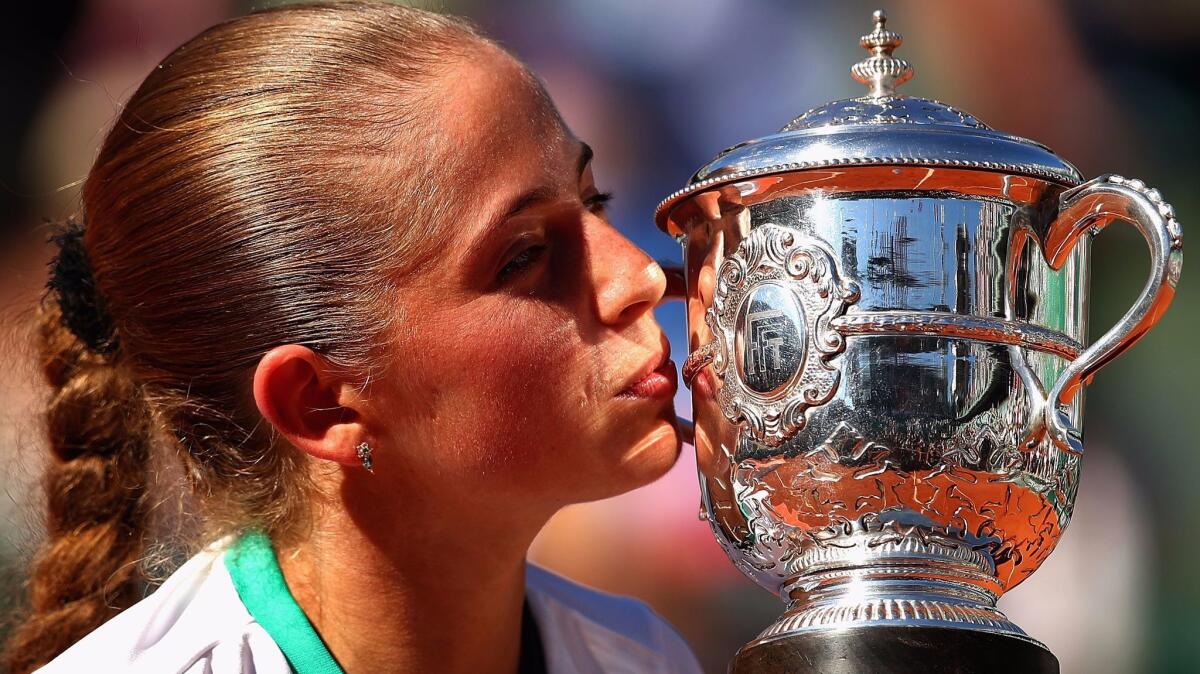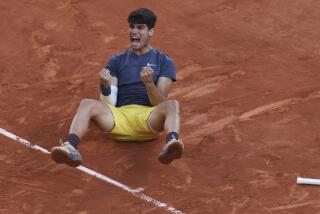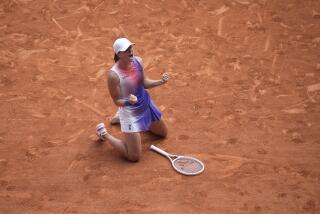Jelena Ostapenko wins her first title by upsetting Simona Halep in French Open final

Reporting from PARIS — Unseeded Jelena Ostapenko of Latvia used bold strokes and an unbending will to come back and stun No. 3 Simona Halep 4-6, 6-4, 6-3 in an enthralling French Open final Saturday for the first title of her career.
Ostapenko, ranked only 47th and just two days past her 20th birthday, became one of the most unlikely Grand Slam champions in tennis history. She also denied Halep what would have been her first major championship and the No. 1 ranking.
“I still can’t believe I won,” Ostapenko told the crowd at Court Philippe Chatrier. “It was always my dream, when I was a child I was watching players here. I’m just so happy. I’ve just enjoyed it so much. I have no words.”
Halep appeared on the way to a relative runaway victory, leading by a set and 3-0 in the second, then holding three break points for the chance to go ahead 4-0. But Ostapenko would not go quietly, winning that game and the next three en route to forcing a third set.
And then, in the third, Ostapenko again summoned a veteran’s resolve, taking the last five games after being down a break at 3-1. She took advantage of a bit of luck, too, holding for a 5-3 lead when she hit a backhand that clipped the top of the net, popped way up in the air, then dropped over onto Halep’s side.
Soon enough, Ostapenko was striking two more winners on the last two points to provide a fitting conclusion.
“All the credit for what you’ve done. It’s an amazing thing. Enjoy, be happy, and keep it going,” Halep told Ostapenko, “because you’re like a kid.”
Sure is. Quite a precocious one.
It was a match filled with wild momentum swings between two players displaying completely disparate styles: Ostapenko’s grip-it-and-rip-it approach vs. Halep’s more conservative keep-the-ball-in philosophy. By the end, the numbers were stark: Ostapenko built a 54-8 edge in winners, but she also had far more unforced errors than Halep, 54-10.
Halep, a 25-year-old from Romania, was playing in her second major final. She was the runner-up to Maria Sharapova at Roland Garros in 2014.
“I’ve been sick in the stomach with emotion,” Halep said. “Maybe I was not ready to win it.”
Ostapenko was playing in only her eighth Grand Slam tournament, never having been past the third round. A year ago in Paris, she lost in the first round. A year before that, she lost in the first round of qualifying at Roland Garros.
The last woman to win her first tour-level title at a major was Barbara Jordan at the 1979 Australian Open. Not coincidentally, that was also the last time at any Grand Slam tournament that none of the women’s quarterfinalists had previously won a major championship.
So Ostapenko stepped into the considerable opening created by the absences of Serena Williams (who is pregnant) and Sharapova (denied a wild card after a drug ban). Also missing was two-time major champ Victoria Azarenka, while No. 1 Angelique Kerber lost in the first round.
That all added up to an up-for-grabs feeling, and Ostapenko seized the opportunity.
She burst onto the scene over these two weeks with a brash brand of tennis. Accenting shots with high-pitched exhales, she likes points quick and is not shy about unleashing a forehand measured as being faster than that of men’s No. 1 Andy Murray. The impatience of youth not only showed up in Ostapenko’s play but also, occasionally, in her demeanor. When she’d miss, she would slap her thigh or crack her racket on the red clay or raise a palm as if to say, “What was up with that shot?”
And when things went her way? She screamed “Come on!” or pumped a fist or smiled broadly.
Halep presents something of a polar opposite with the ball in play: She extends points, grinding along the baseline and sliding to retrieve ball after ball, forcing foes to come up with the goods time after time.
Put those games together and, predictably, the points were often entertaining, played in a slight breeze with the temperature at about 80 degrees (above 25 Celsius) and with nary a cloud marking the azure sky.
Ostapenko showed right away she would not be bashful in, by far, the biggest match of her nascent career, breaking Halep at love in the opening game by bashing the ball, drawing loud, appreciative gasps of “ooh!” and “aah!” from spectators. But Halep broke right back, and then took the set with a break in the final game.
A telling statistic: Of the 33 points Halep won in the first set, only one — yes, just one! — came via a winner off her racket.
Halep moved ahead in the second set, before faltering midway through. And the same scenario played out in the third.
Soon enough, Ostapenko was holding her silver trophy — remember, the first she’s ever won on tour — while listening to the Latvian national anthem ring through a Grand Slam stadium after a singles final for the first time.
More to Read
Go beyond the scoreboard
Get the latest on L.A.'s teams in the daily Sports Report newsletter.
You may occasionally receive promotional content from the Los Angeles Times.










